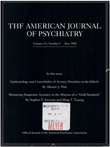Mental health status and community adjustment after treatment in a residential treatment program for homeless veterans
Abstract
OBJECTIVE: An uncontrolled outcome study was conducted to examine clinical improvement and the relationship of psychiatric and substance abuse problems, community adjustment, and housing status among homeless veterans who participated in a multisite residential treatment program. METHOD: The study was performed at three U.S. Department of Veterans Affairs medical centers in Florida, Ohio, and California. Baseline, discharge, and 3-month postdischarge follow-up data were collected for 255 veterans admitted to the Domiciliary Care for Homeless Veterans Program. Multiple dimensions of outcome were examined, including psychiatric symptoms, alcohol abuse, drug abuse, social contacts, income, employment, and housing. RESULTS: Program participation was found to be associated with improvement in all areas of mental health and community adjustment. Improvement in psychiatric symptoms was associated with superior housing outcomes and improvement in community adjustment. When correlates of improvement in alcohol and drug abuse were examined, only one of eight possible relationships was found to be significant: improvement in alcohol problems was positively associated with improvement in employment. CONCLUSIONS: Homeless mentally ill veterans derive clear benefits from participation in a multidimensional residential treatment program. Improvement in mental health problems, however, is weakly linked to improvement in other areas, suggesting that treatment programs may have to attend separately to multiple domains of life adjustment.
Access content
To read the fulltext, please use one of the options below to sign in or purchase access.- Personal login
- Institutional Login
- Sign in via OpenAthens
- Register for access
-
Please login/register if you wish to pair your device and check access availability.
Not a subscriber?
PsychiatryOnline subscription options offer access to the DSM-5 library, books, journals, CME, and patient resources. This all-in-one virtual library provides psychiatrists and mental health professionals with key resources for diagnosis, treatment, research, and professional development.
Need more help? PsychiatryOnline Customer Service may be reached by emailing [email protected] or by calling 800-368-5777 (in the U.S.) or 703-907-7322 (outside the U.S.).



